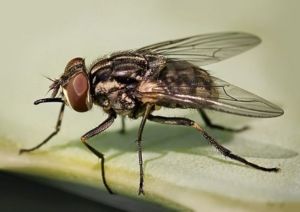News
Airborne blood-suckers a potential risk to Danish exports
This article is more than 6 years old.
Fences may not be enough to keep pig infection out of Denmark

The stable fly – small but potentially costly to pig farmers (photo: Pavel Krok/Fir0002)
The old adage ‘pigs might fly’ indicates an improbable event.
Scientists from the Technical University of Denmark (DTU) have just discovered an improbable event of their own from the real world involving porcine protagonists: blood-sucking stable flies are capable of infecting pigs with the dreaded African swine fever.
At the agricultural research centre on the island of Lindholm (soon to become a prison for criminal foreigners and rejected asylum-seekers), researchers from DTU’s veterinary institute have been able to feed pigs with flies infected with the disease, reports DR Nyheder.
Blood thicker than water
“This shows that blood-sucking insects such as stable flies are able to infect a new host – not by biting the host, merely by being eaten,” said senior researcher René Bødker.
“If a fly that has sucked blood from an infected wild boar enters a piggery and is then eaten by a pig, then the pig can contract African swine fever,” he added.
This rather renders the 70-km long fence being built across Denmark at a cost of 30 million kroner redundant.
READ ALSO: Huge border fence to keep out swine fever
The reason given for erecting the fence is to keep wild boar from crossing the border from Germany into Denmark and thus potentially infecting Danish pig populations.
An expensive business
Danish agriculture has estimated that it could cost up to 11 billion kroner in lost exports should the disease take hold.
On the other hand, Bødker does not expect flies to be the culprit if the infection does spread across the border. Firstly the flies are only infectious for 6-12 hours, and secondly they do not fly over great distances, he points out.
There might however be a problem if there is a herd of wild boar very close to a piggery. In such cases the only way to eliminate the risk is to make the piggery fly-proof, and that would be a very expensive proposition.










































